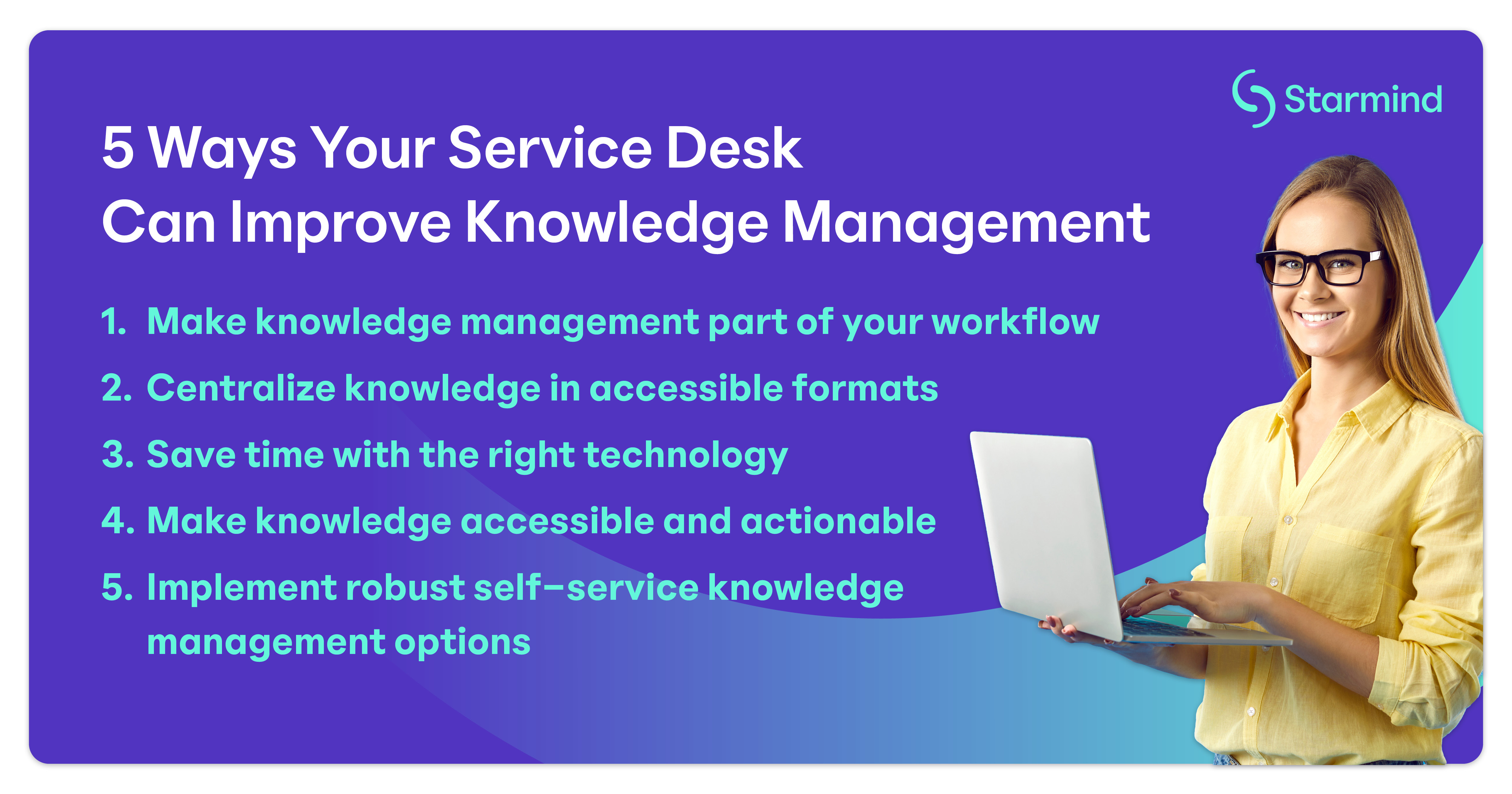Contents
When your employees have an IT issue, how easily can they access the information they need to try to solve the problem themselves? Traditional service desk knowledge management systems are often clunky and hard to navigate, and its no wonder it just seems easier for employees to open support tickets instead.
The result: Ticket queues keep getting longer, leaving both the employees who need help and the IT workers on the other side of the request feeling frustrated.
The only way to reduce support ticket volumes is to reduce the number of tickets raised by giving every employee access to the knowledge they need to be self-sufficient. Let’s review how modern knowledge management can benefit your IT service desk.
Why Knowledge Management for IT Service Desks Is Important
Excessive ticket queues are a growing problem at many enterprise organizations – and there’s a growing cost that comes alongside those queues.
And yet, 80% of those service tickets are repeat questions, making them perfect for self-serve resources that allow your employees to quickly find their own solution without involving your service desk staff. After all, your employees aren’t submitting tickets because they want to bother the service desk. They do so because it’s often the quickest or easiest way to arrive at an answer. Even when they know the answer exists somewhere within the company, they don’t know where to look or can’t access the information.
Modern knowledge management systems are designed to help you move beyond mere documentation of knowledge and toward seamlessly capturing knowledge in the flow of work and putting it to work across the enterprise.
The end users aren’t the only beneficiaries. Your help desk employees also appreciate the reduced workload, as repetitive ticketing is associated with lower employee morale and higher turnover. They’re able to focus their attention on the novel, more challenging problems that warrant the extra time.
5 Ways Your Service Desk Can Improve Knowledge Management
Make Knowledge Management Part of Your Workflow
The knowledge in your organization is constantly evolving. As the business evolves, these updates should also be reflected in your knowledge base. Adopt a knowledge management system that can naturally fit into your workflow. You don’t want to install yet another system that requires your service desk team to spend additional time on knowledge transfer documentation.
Centralize Knowledge in Accessible Formats
Enterprise organizations collect vast amounts of data and documentation. This valuable knowledge is often spread across different departments, platforms, devices and people, making it difficult to find and access quickly.
By centralizing your IT support team’s knowledge, you can provide employees with a repository that can quickly provide answers and resources. This makes it easier for employees to locate information quickly, make smarter decisions and contribute their own insights to the organization’s collective knowledge.
When employees know they have a single location they can trust for what they need, they’re more likely to engage with it and to a greater degree.
Save Time With the Right Technology
The average help desk employee spends over four hours every week keeping information resources updated.
With a modern knowledge management system in place, retaining and growing knowledge can become part of your workflows and daily tasks — and take less time. The right platform can reduce support ticket volumes, accelerate time to resolution and reduce cost per ticket.
In fact, many businesses can see a near-immediate impact by improving their organization’s ability to access knowledge, on their help desk and beyond. Our Future of Work report indicates that nearly half (48%) of employees said they “can’t access the knowledge they need quickly and easily to do their jobs effectively.”
Knowledge management systems can serve as a go-to source for employees to find answers or information related to previously answered questions. This empowers employees to resolve issues on their own without submitting a service ticket or pulling in co-workers to assist them directly.
Technology by itself isn’t a solution, of course. Deploying the wrong technology or failing to integrate software systems can create even more work for employees and further fragment knowledge. Technology should help employees seamlessly search for and find answers so they can return to their work. Implemented successfully, you’ll increase efficiency, productivity and the ability for employees to contribute to the organization’s overall knowledge.
Make Knowledge Accessible And Actionable
Employees often submit service requests when they can’t quickly and easily locate knowledge on their own. Research from Forrester commissioned by Starmind indicates that nearly two-thirds of employees say they “spend too much time getting a resolution.” Almost 40% “become increasingly disengaged as they feel frustrated and overwhelmed.”
It’s important to note that this employee frustration can also be felt by customers when inaccessible knowledge begins to impede customer-related projects or interactions. Most organizations suffer from this inefficiency, as 68% of respondents said “projects have been delayed due to missing information.”
When employees have access to the knowledge and resources they need, they can feel more confident, and they make better-informed decisions. They’re also more likely to share their knowledge with others, which helps your organization be more informed, productive and innovative
Implement Robust Self-Service Knowledge Management Options
Not every issue can be self-resolved. Some are complex or critical enough to the business that you should file a ticket or bring in multiple parties. However, most service tickets are standard, repeatable questions that could be addressed with self-service. These issues might originate from many different users, departments or functions, but they are essentially the same.
When employees can resolve these issues independently, they’ll be less reliant on service tickets to resolve routine issues. Provide your team with knowledge management practices that allow them to access on-demand answers to your organization’s most common problems. This approach eliminates the need for colleagues to respond, saving time and money for your organization and especially for your service desk.
Find Additional Knowledge Management Support
Service desk knowledge management is an ongoing process. Knowledge will continue to change and grow with your organization, and you need to keep capturing the most up-to-date information as it’s available.
You can’t eliminate support tickets, but proper knowledge management can drastically reduce the number of tickets filed and increase employee self-resolution. An estimated 102 minutes of every working day is spent looking for answers. When those answers can’t be found easily, many team members give up and submit support tickets as a primary alternative rather than a last resort.
Starmind is an ideal solution for organizations because it’s powered by artificial intelligence and connects every employee to your organization’s best available knowledge in real time. Our solution moves beyond documenting knowledge and improving communication by building a real-time network of knowledge and expertise. This ensures your team always has access to the most accurate, up-to-date information possible.
Companies that partner with Starmind to improve service desk knowledge management can reduce time spent searching for answers by 75% and decrease support ticket volumes by 12%. These efficiencies can add up to 33 hours saved per user every year.
Interested in learning more? Here’s a practical guide to help desk knowledge management.




